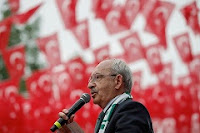A budding courtship between Russia and Iran is an unwelcome
development for the West in general and the United States in particular.
Russian President Vladimir Putin used a rare foreign trip on
Tuesday to hold talks in Tehran with Supreme Leader Ayatollah Ali Khamenei and
President Ebrahim Raisi, as well as Turkish President Tayyip Erdogan.
The fact that Russia and Iran are competing energy producers
is likely to place limits on any deeper partnership.
Here's a look at some of the key questions that their
developing relationship poses.
CAN
IRAN HELP RUSSIA IN THE UKRAINE WAR?
US officials have said Iran is preparing to help supply
Russia with several hundred unmanned aerial vehicles (UAVs), or drones,
including some that are capable of firing weapons, but neither country has
confirmed it. Russian presidential aide Yuri Ushakov was quoted by RIA news
agency as saying Putin had not discussed the issue with Iran's leaders.
"Russia deepening an alliance with Iran to kill
Ukrainians is something that the whole world should look at and see as a
profound threat," US National Security adviser Jake Sullivan said last
week.
Ukraine has used Turkish-supplied Bayraktar drones to lethal
effect in targeting Russian units and destroying huge quantities of tanks and
other armored vehicles. Jack Watling, a war expert at the RUSI think-tank in
London, said Iranian drones would be useful to Russia for both reconnaissance
and as loitering munitions that can bide their time in locating and engaging
suitable targets.
"Beyond supplying UAVs Iran can also help Russia evade
sanctions and potentially collaborate on the manufacture of weapons systems
that are less dependent upon supply chains through Western countries," he
said.
WHAT
CAN RUSSIA LEARN FROM IRAN ON SANCTIONS?
Iran has many years of experience of defending itself
against Western sanctions over its disputed nuclear program. "The Russians
see Iran as being highly experienced at, and a potentially valuable partner, in
evading Western sanctions," said Watling.
Russia, meanwhile, has been hit with waves of sanctions
against banks, businesses and individuals over the war in Ukraine. Both
countries therefore lack access to Western technology and capital, said Janis
Kluge of the SWP think-tank in Berlin.
"There might be some lessons that Russia can learn from
Iran... In exchange, Russia could offer military goods and possibly raw
materials or grain," he said. Russia is already a major supplier of wheat
to Tehran.
With some Russian banks cut off from the SWIFT international
payments system, Moscow is developing an alternative in which Iranian banks
could be included, Kluge said.
More broadly, Iran is part of a wider group of countries -
also including China, India, Latin America and Arab and African nations - with
which Russia is forging stronger ties in a bid to prove its claim that it can
thrive under sanctions and that these will only rebound on the West.
HOW CAN
RUSSIA AND IRAN COOPERATE ON ENERGY?
This is potentially a sensitive question, both countries are
oil and gas producers, and competition between them has intensified since the
start of the Ukraine war as Russia has switched more of its oil exports to
China and India at knock-down prices.
"On the economic dimension, the war has significantly
worsened their relationship. Moscow is eating Tehran’s lunch in commodity
markets and has even fewer resources to throw at projects in Iran," said
Henry Rome, deputy head of research at Eurasia Group.
Coinciding with Putin's visit, however, the National Iranian
Oil Company and Russia's Gazprom signed a memorandum of understanding
worth around US$40 billion under which Gazprom will help NIOC develop two gas
fields and six oil fields, as well as taking part in liquefied natural gas
(LNG) projects and construction of gas export pipelines.
WILL
ANYTHING CHANGE IN THE IRAN NUCLEAR TALKS?
The Ukraine war has changed Moscow’s approach towards talks
on reviving the 2015 Iranian nuclear deal, known as the JCPOA.
Eleven months of talks to restore the deal, which lifted
sanctions on Iran in return for curbs on its nuclear program, had reached their
final stages in March. But they were thrown into disarray over a last-minute
Russian demand for written guarantees from Washington that Western sanctions
targeting Moscow over its invasion of Ukraine would not affect its trade with
Iran.
Although Russia quickly retreated under Iranian pressure,
diplomatic momentum for an agreement was lost. The talks have stalled since
then over various remaining issues.
Whether the deal can get back on track will be one measure
of the impact of the rapprochement between Putin and Iran's leaders.
"Russia’s interference in the JCPOA talks was a
significant reversal of the traditional Russian approach and probably further
fanned suspicions in Tehran about Moscow’s reliability and
trustworthiness," said Rome of Eurasia Group.








